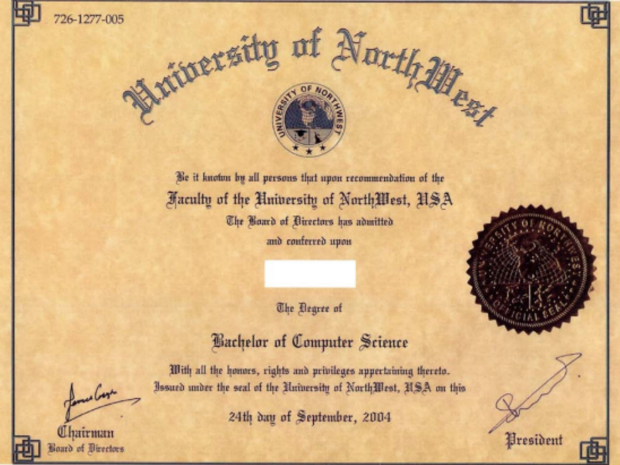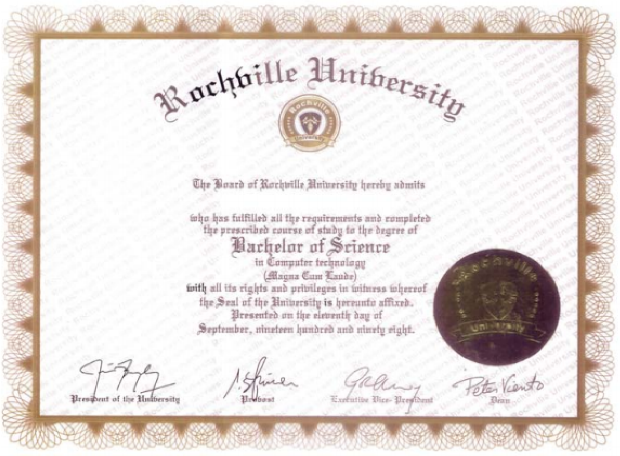Your MD may have a phony degree
High school journalists in Pittsburg, Kansas, recently uncovered a troubling and at times dangerous trend that's far more prevalent than realized. They garnered national attention for their discovery about the credentials of their school's new principal.
"We stumbled on some things that most might not consider legitimate credentials," Trina Paul, a senior and an editor of the Pittsburgh High School newspaper, told the Kansas City Star. Within days of the students publishing their story, principal Amy Robertson had resigned from her $93,000-a-year position. She said she obtained both master's and doctorate degrees from a Corllins University, whose existence the U.S. Department of Education has no evidence of, and reportedly swiped a commencement photo Wake Forest University in North Carolina used for its own marketing,
Robertson is far from alone in touting a pedigree that includes a degree from Corllins, described in multiple news stories as a diploma mill. A recent search of LinkedIn found 745 people, including public-safety workers, lawyers, engineers, educators and federal government employees, holding degrees from Corllins.
The career-oriented social network's listings of Corllins grads include a computer scientist at the Centers for Disease Control and Prevention in Atlanta, a personal assistant to the Deputy Secretary of State in Washington, D.C., an executive director of consumer and community banking at JPMorgan Chase (JPM) in Texas and a flight nurse with an air evacuation team in the Lone Star State.
Given Corllins is just one of many "schools" engaged in the booming business of offering bogus degrees for payment, there's every reason to believe physicians, lawyers and engineers are among those currently employed in positions obtained through bogus degrees. And unlike decades past, the internet has only made an unscrupulous industry that much more accessible to people looking to purchase, rather than earn, credentials. And it has lowered the overhead costs for those offering the illegal service.
"Diploma mills have been around for more than 700 years, and things are worse now than they've ever been," said John Bear, co-author of "Degree Mills: The Billion-Dollar Industry That Has Sold Over a Million Fake Diplomas." He added: "Just two of the sellers -- Axact from Pakistan and University Degree Program (UDP) run by an American in Romania -- have accounted for many hundreds of thousands of sales to Americans, and that's just the tip of the iceberg. More than half of all new PhDs in the U.S. each year are fake."
Doctored degrees
There's little reason to doubt that sales of degrees have only become even more prevalent since a federal probe executed from 1989 to 1991. It was dubbed "DIPSCAM" for "Diploma Scam," and resulted in the dismantling of 40 phony schools, 19 federal grand jury indictments, 20 convictions and the purchase of 40 diplomas and transcripts.
"Our best guestimate is there are 5,000 diploma mills at any one time, and probably the same number of fake accrediting agencies," said Allen Ezell, a 31-year FBI veteran who helped run DIPSCAM. "I'm not paranoid, but it's everywhere," he added.
Federal agents identified 12,500 graduates of the 40 fake schools, and those who had purchased bogus degrees included "federal, state and county employees," Ezell (Bear's co-author) told CBS MoneyWatch. "Graduates were employed in business, education, law enforcement, military and in the medical field."
A 2006 paper published in the Hofstra Labor and Employment Law Journal cited congressional testimony for some startling data, including an estimate from the National Council for Accreditation of Teacher Education that one of six education doctorates are fraudulent.
"Even more disturbing, an extrapolation of the percentage of people holding fake diplomas in the medical field revealed potentially 2 million 'bogus practitioners' in the United States," wrote Creola Johnson, a law professor at Ohio State University. "The testimonial evidence concluded that at least 500,000 Americans hold fake degrees."
Many of those holding fake MDs are "small-town doctors that have military field medic training and can do stitches or an injection," said Bear, who like Ezell, works as a consultant. "Many are smart enough to know if they can't handle a case, they pass it on."
But unfortunately, that doesn't always happen. Bear, who started tracking bogus institutions while writing a guide to earning a degree through distance learning, was an expert witness in a manslaughter case in North Carolina against two men who had purchased doctors' IDs for $100 purporting to be from the University of London.
"They had cure-all substances they sold online," Bear said of the pair. "They took a young girl off insulin, put her on their potion, and she died."
Ezell noted that when he needed an operation four or five years ago, he checked the credentials of both his surgeon and the anesthesiologist, and he advises others do the same. "It's serious. Don't assume they are what they say they are."
Sky's the limit
The largest gross revenue of any fraudulent school Ezell visited as an FBI agent was $2 million, netted during a roughly three-year period from three schools run in Ohio and Arizona. But that was pre-internet, so the schools generated business by advertising through the mail, flyers or matchbook covers. "It was worldwide then, but in a different vein. Now it's astronomical," said Ezell, who left the FBI in 1991 but continues to track bogus degrees as a consultant. "It's a big business, and $2 million is nothing."
Graduates from UDP, the biggest diploma mill of its time, "are still flushing up today," said Ezell of the operation, which grossed $435 million from the sales of more than 200,000 bogus degrees, including medical, from 1998 to 2003, when the U.S. Federal Trade Commission shut it down. The FTC imposed a $180,000 civil fine on those running UDP, he said, but they were not criminally prosecuted and eventually resumed business under new names and web addresses.
"White-collar crime has always taken the back seat of the bus," said Ezell, who recently used a stored-value international Visa card to purchase an MBA from a school run by Axact, now the target of a criminal probe by Pakistan officials. "I told them the date I wanted to graduate, the major I wanted and the GDP I wanted. It was a cheapie: $500 for an MBA," he said. "They took my money and sent me a package with a diploma, transcript and letters of recommendation three to four weeks ago."
Ezell's work was conducted on behalf of a corporate client in a civil case against an executive, who settled with the company after being confronted with the evidence that his diploma came from an entity that sold bogus credentials.
Bogus degrees, real risks
"The U.S. continues to hold the dubious title of most popular location for diploma mill providers; 1,008 are known to have operated or currently operate from the country, an increase of 198, or 20 percent," from the year earlier, found Verifile, a London-based screening company in a 2011 report. "The sheer number in existence indicates that selling degree certificates is big business for diploma mill operators, and that bogus degrees present real risk for prospective employers, educators and the general public.
Verifile's report was released not long after a skyscraper built with input of a man with a phony engineering degree collapsed during an earthquake in New Zealand, killing 155 people. "For every high-profile case, there are many, many more bogus degrees used by ordinary people," noted Verifile in its report.
The city of Baltimore offers a recent example. A 32-year veteran of the city's police department now faces theft charges of "unlawfully presenting as genuine a false diploma." The ex-detective, Staccato Butler, also lost his adjunct faculty position in the University of Baltimore's high-technology program.
"As long as we and other countries are in a credential-conscious society, credentials are going to matter," said Ezell, who noted that employers unwittingly motivate workers to purchase bogus credentials by offering higher salaries for advanced degrees. In Seattle, a sheriff's detective got a phony online college degree to get a 2 percent raise, an issue that came up when he ran for sheriff.
"People lie about degrees they haven't earned -- or purchase spurious degrees from diploma mills -- because it works. The gatekeeper in almost all of this is the HR department," said Rich Douglas, who studied the issue for 15 years as part of doctoral dissertation. "They don't know what they're looking at, and they don't seem to care. This allows a deputy secretary for IT of the Department of Homeland Security and the chief nurse of a huge hospital system to claim unaccredited degrees in plain sight."
The professional organizations for HR do not require people to know the differences between accreditation and state licensing, said Douglas, who holds certifications from both the Society for Human Resource Management and the HR Certification Institute. "Given that hiring managers usually, but not always, rely on their HR departments to screen applicants, I'd say a little knowledge would go a very long way," said Douglas, who's an advocate of additional training for HR pros.
"I don't think there's the political will, but it's an easy thing to eliminate," said George Gollin, a professor of physics at the University of Illinois at Urbana-Champaign. He started looking into diploma mills when he began getting a lot of spam from one. "I called, expecting to scream at them, and instead I got a sales pitch that I could get any degree I wanted for $4,000."
When Abraham Lincoln was inaugurated, a third to half of U.S. currency was counterfeit, with each state generating its own script and banks printing it. The problem was largely solved by the nationalized production of U.S. currency, said Gollin, who believes the federal government, rather than individual states, should determine the legal definition of a degree provider.
The U.N. Educational, Scientific and Cultural Organization could keep a list of legitimate universities, with consumers getting alerts when they visit websites of entities not on the list. That would be "the same kind of security that turns on when there's contact by web browsers to a trusted source," Gollin said.
Ezell's suggestion for curbing the problem? Assign one or two FBI agents to work academic fraud. "The word will get out, I promise you there's a grapevine for the industry. They will know," he said. Ezell added that it should also be made clear to would-be buyers of the phony degrees that they risk job loss and prosecution if they do so.





